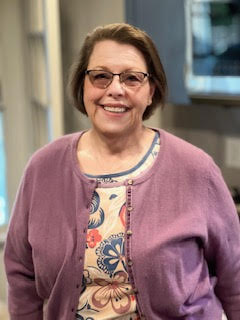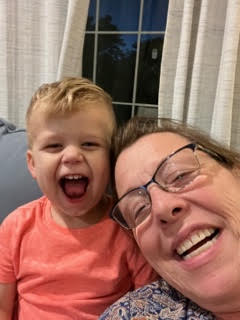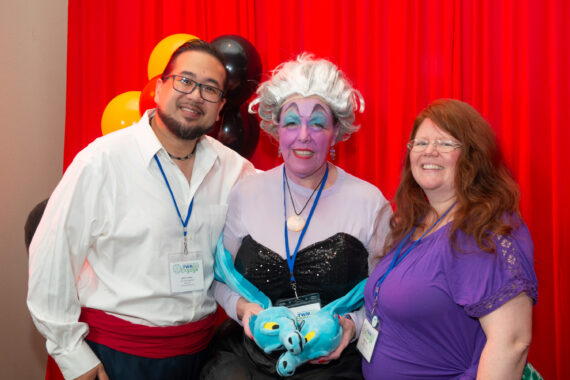
Meet Mary Tripp, a long-time member of the Obesity Action Coalition (OAC) who stands out not only for her passion for advocacy but also for her creativity that lights up OAC Conventions. Mary’s journey with obesity started early, exposing her to challenges with weight and stigma since childhood. Through ups and downs, she found acceptance and support within the OAC Community, which she describes as feeling like a home.
In a recent interview with CNBC, Mary shared how incorporating GLP1 medications into obesity treatment has positively affected her health and weight-loss. Her journey exemplifies the strength and resilience within the OAC Community, inspiring others to embrace their voices and reshape the conversation around obesity.
What has been your experience with obesity, including when you were diagnosed and the challenges you’ve faced over the years?
One of my first memories of anyone talking about my weight was in third grade when a boy at my new school called me “fat” despite not being overweight at the time. In fifth or sixth grade, I started gaining weight and attended Weight Watchers in seventh grade. My parents would offer me money to lose weight, believing it would help motivate me. I know they did this out of love, but I can’t help wondering if their efforts actually had the opposite effect on me. Feeling different from my siblings, I turned to food for comfort in secret. I was the only person in my family to struggle with food in this way. My sisters would tell me I couldn’t borrow their t-shirts because I would stretch them out. At that point in time, I wore a size medium, and they wore a small.
As I was recently looking through childhood pictures, I realized my perception of my weight didn’t align with reality. Despite being a normal size, these early experiences fueled my lifelong battle with food and trying every diet plan imaginable. Everything seemed to hinge around “If you lose 20 pounds, you can do this or get that.” As I got older, I remember losing weight before I got married, but with each baby, I would gain more weight that would be harder to take off. I reached my highest weight in 2008, and it was getting harder to do things with my children. I had to ask for seatbelt extenders on airplanes, I couldn’t ride many rides at amusement parks, and I didn’t have much energy.
I finally decided to have gastric bypass surgery in 2009. This resulted in significant weight-loss, but I never fully achieved my goal. Over the years since my surgery, I’ve also put a lot of that weight back on. But through all of these struggles, my greatest experience has been connecting with the most wonderful, knowledgeable and understanding group of people that make up the OAC. Here, I feel at home, accepted and understood.

In your recent interview with CNBC, you discussed your use of GLP-1 medications. How has incorporating medicine into your obesity treatment journey impacted your health?
Following my gastric bypass surgery in 2009, I still faced ongoing challenges in maintaining my weight-loss. When my doctor recommended Ozempic due to my type 2 diabetes history, covered by insurance, I figured I would try it. Over the past year, I’ve successfully lost 60 pounds and continue to lose weight. Ozempic has notably curbed my constant thoughts about food and eliminated cravings for snacks and candy that troubled me before. My most recent blood work in early October showed positive results across the board. I feel wonderful and have increased energy that allows me to stay active and keep up with my two highly energetic grandsons.
As a long-time OAC member and donor, can you share the impact of OAC on your journey and how its support has influenced your views on obesity and its treatment?
I’ve been part of the OAC since 2015, and I regularly attend Conventions. The insights I’ve gained from top-notch experts in fields like obesity, nutrition and psychology, all grounded in science, have been invaluable. This knowledge helped me shift away from self-blame for my weight regain. I learned it’s okay to seek additional help along the way, such as taking GLP1 medications, in treating obesity as a disease. Just like with any other disease we may battle. Donating to the OAC brings me joy because I can help others access the same wealth of information through the Convention that has helped me so much over the years.
You’ve attended the OAC’s Your Weight Matters Conventions for years. Can you share your most impactful experiences from these events, and how they have contributed to your advocacy and education in obesity management?

I’ve have SO many memorable experiences! One of the highlights has been the insights shared by knowledgeable speakers, many of whom I now consider friends. Their perspectives energize me during and beyond the conventions but also deepen by understanding of obesity management. The supportive community within this group has empowered me to express myself creatively, as seen in the annual costume contests I’ve won a lot of.
Through my journey with the OAC, I’ve discovered my voice. Years ago, it was difficult for me to have open conversations about my experiences. I felt isolated and was embarrassed to talk to anyone, especially doctors, for fear of judgment. The OAC has given me the confidence to speak up not only for myself but also for others, emphasizing that obesity is a disease and not a result of personal fault.
What are the key challenges for individuals with obesity seeking treatment and support?
One major challenge is finding the right doctor who will do everything in their power to fight with you for the care you need. My endocrinologist has been there for me through all my difficulties in my journey with obesity. She always takes the time to truly listen to me and help me find solutions. Even when I get discouraged, her positive encouragement helps me pick myself up and try again.
Another challenge is securing insurance coverage for essential medications, but I believe if we continue to speak up for ourselves and others, it will happen. Advocacy efforts have made progress, as seen in the increased acceptance of bariatric surgeries by insurance companies. However, there’s a need for further changes to ensure affordable access to all medications. Despite these challenges, collective voices, like those in the OAC, can drive positive change by speaking up for those who are unable to speak up for themselves. Together, we can all be effective in making a difference.
Do You Want to Share Your Story?
Whether you have a story about navigating obesity, facing weight stigma, or inspiring others, your voice is important. Visit the OAC’s story project at WeightoftheWorld.com to share yours today. Not sure what to say? Consider one of our question prompts to guide you.
If you would like your story to be featured in a future issue of Weight Matters Magazine, please email membership@obesityaction.org.
